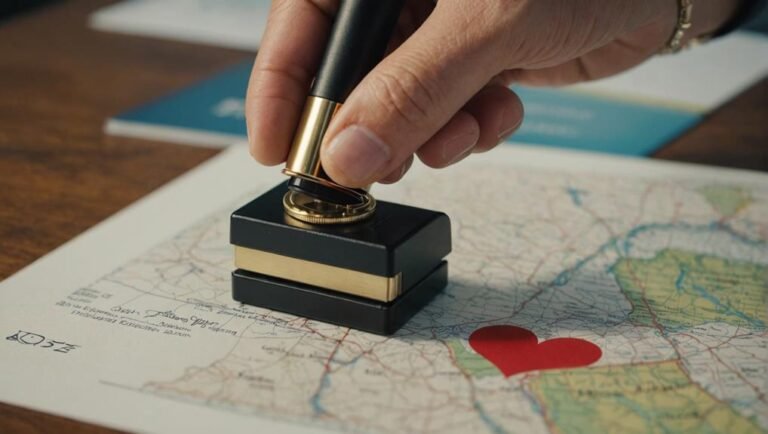In Florida, you must have a notary stamp. This stamp must follow specific rules set by the law to validate documents. The stamp should be a rubber stamp using black ink. It's essential for proving authenticity. Your stamp has to include your name, commission number, expiry date, and the State of Florida. For electronic files, the same details are needed. Consider having both an embosser and stamp for added security. Your notary stamp is important for ensuring integrity and legality. Remember, attention to detail is key for upholding notarization standards.
Key Takeaways
- Florida notaries are required to have a seal for notarizing documents.
- The seal must include notary's name, commission number, expiration date, and State of Florida.
- Both traditional stamps and embossers are acceptable for the seal.
- Ordering a Florida notary seal should include essential information for validity.
- Prompt reporting of lost seals is crucial to prevent misuse and ensure compliance.
Florida Notary Seal Requirements
One must adhere to specific guidelines outlined by Florida law regarding the use of an official emblem on notarized documents.
In Florida, the notary emblem is typically affixed using a rubber stamp with black ink. While embossers can be used in conjunction with the emblem, they don't replace the requirement for an inked stamp. The use of black ink guarantees reproducibility as per Florida notary requirements.
It's important to note that Florida law doesn't specify the exact shape or dimensions of the emblem, allowing for some flexibility in design. However, the essential aspect is that the emblem is present on all notarized documents to certify the authenticity of the notary's signature and the transaction.
Proper Usage of Florida Notary Seal
To comply with Florida notary law requirements, the proper usage of the Florida notary seal is essential when notarizing documents. The Florida notary seal must contain specific information, including the notary's name, commission number, expiration date, and the State of Florida. This information is vital for validating the authenticity of notarized documents in the State of Florida.
Even when dealing with electronic documents, the same seal details must be included, although the presentation may vary, and a direct seal image may not always be necessary. It's recommended that a notary supplies package include both a seal embosser and an inked stamp to guarantee compliance with state regulations.
Ensuring the accurate and consistent application of the Florida notary seal on all notarized documents is crucial for upholding the integrity and legality of the notarization process within the state.
Ordering Florida Notary Seal
When ordering a Florida notary seal, make sure that all necessary information including the notary's name, commission number, expiration date, and State of Florida is accurately included to comply with state regulations.
The Florida notary seal is an important element for notarized documents, guaranteeing their validity and authenticity. It's essential to adhere to the state's requirements when obtaining an official seal to guarantee that all notarized documents meet legal standards.
Additionally, for electronic documents, the seal must contain the same essential information, although a direct seal image may not be necessary. Custom emblems can be incorporated into the seal design, with the exception of the Great Seal of Florida.
To ensure compliance with Florida's regulations, it's advisable to consult with a reputable vendor specializing in notary seals. This consultation will help you obtain a Florida notary seal that aligns with the state's requirements for proper notarization.
Renewing Florida Notary Seal
Renew your Florida notary seal promptly upon commission expiration to guarantee compliance with state regulations.
When renewing your Florida notary seal, make sure that it includes essential information such as your name, commission number, expiration date, and the State of Florida. This information is necessary for validating the authenticity of your notarization on official documents.
For electronic documents, the same seal information must be included, even if a physical image of the seal isn't required.
Custom emblems can be incorporated into your seal design, except for the Great Seal of Florida, which holds special significance.
When renewing your seal, remember that it's an important tool for notarizing both traditional paper documents and electronic files. Hence, ensure your notary supplies package includes a seal embosser and inked stamp to cater to the needs of different document formats and authentication requirements.
Handling Lost Florida Notary Seal
Report a lost Florida notary seal promptly to local law enforcement and the Secretary of State for replacement. Failing to report a lost seal can lead to unauthorized use by individuals with malicious intent.
To prevent misuse and protect your notary status, it's important to take immediate action upon discovering the loss. Secure storage of the notary seal when not in use is crucial to minimize the risk of misplacement.
Promptly replacing a lost seal is essential to resume notarial activities and maintain compliance with Florida notary regulations. By promptly addressing a lost seal, you contribute to the prevention of potential misuse and uphold the integrity of your notary responsibilities.
Remember that timely reporting and replacement of a lost Florida notary seal are key steps in ensuring the security and proper use of your notarial tools.
Compliance With Florida Notary Seal
Upon notarizing documents in Florida, adherence to the state's specific requirements for the official seal is vital to guarantee compliance with Florida notary laws.
As a Florida notary public, it's imperative to utilize a rubber stamp seal with black ink when affixing the notary seal onto notarized paper documents. While embossers can be used in addition to the inked stamp, they can't serve as a substitute under Florida regulations.
The notary seal must be reproducible in black ink, ensuring clarity and legibility on the notarized documents. Although Florida law doesn't dictate the precise shape and dimensions of the seal, it's essential to maintain a professional and consistent appearance in line with notary standards.
Florida Notary Stamp Validation
Utilize a rubber stamp seal with black ink to validate the Florida notary stamp on documents as per state requirements. Florida notary stamps must be affixed using a rubber stamp notary to ensure compliance with the law.
The use of photographically reproducible black ink is essential for clear reproductions on notarial certificates. It's vital that the official seal includes specific details such as the notary's name, commission expiration date, and the State of Florida.
While embossers can be used in conjunction with the inked stamp, they don't serve as substitutes. Customized seal designs may include personal emblems, but they shouldn't incorporate the Great Seal of Florida.
Florida Notary Seal Care Tips
To maintain the integrity and effectiveness of your Florida notary seal, make certain proper care and storage practices are consistently followed. When tending to your seal, store it securely in a locked location when not in use to prevent unauthorized use. Always use black ink when affixing the seal on notarized documents to guarantee clarity and reproducibility. Check that the seal includes your name, commission number, expiration date, and State of Florida for proper identification. Regularly inspect the seal for any damage or wear, and promptly replace it if necessary to uphold a professional image.
| Care Tips for Florida Notary Seal | ||
|---|---|---|
| Store securely when not in use | Use black ink | Verify all required information |
| Avoid use outside Florida | Regular inspection and replacement |
Notary Embosser in Florida
Notary embossers are permitted for use in Florida as a supplementary tool alongside the official inked stamp. In Florida, notary embossers serve as an additional security feature for notarized documents.
When using an embosser, it's important to remember that it doesn't replace the official inked stamp required by the state.
Notary embossers in Florida must include specific information such as the notary's name, title, and the State of Florida to be considered valid.
These embossers are commonly used by notaries in Florida to enhance the security and credibility of their notarized documents.
Frequently Asked Questions
Can I Notarize in Florida Without My Stamp?
You must notarize in Florida with your stamp. It is essential for verifying signatures. As a notary public, using the stamp is mandatory. Failure to do so can have legal implications, jeopardizing the validity of notarized documents.
What Are the Requirements to Notarize a Document in Florida?
To notarize a document in Florida, you need a valid notary commission, verify signatures, recognize signatories, request proper identification, adhere to state regulations, act as a notary public, and affix the official seal using a rubber stamp.
What Are the Requirements for a Notary Acknowledgement in Florida?
When verifying signatures on legal documents in Florida, make sure the notary public acknowledges the signer's presence, verifies personal identification, and upholds responsibilities. Proper notary training, a valid notary commission, and witness presence are essential.
What Identification Is Needed for a Notary in Florida?
To become a Florida notary, you must present a valid ID for identification verification, show proof of residency, authenticate your notary commission, verify your signature, provide license authentication, and potentially have witness testimony for document verification in your notary journal.
Conclusion
To sum up, ensuring that your Florida notary seal is properly maintained and used in accordance with state regulations is essential for upholding the integrity of notarized documents.
Remember the old saying, 'Seal it with a stamp of approval,' as you navigate the requirements and responsibilities associated with your Florida notary seal.
By following the proper procedures for ordering, renewing, and caring for your seal, you can uphold the trust and professionalism expected of a notary public in Florida.






